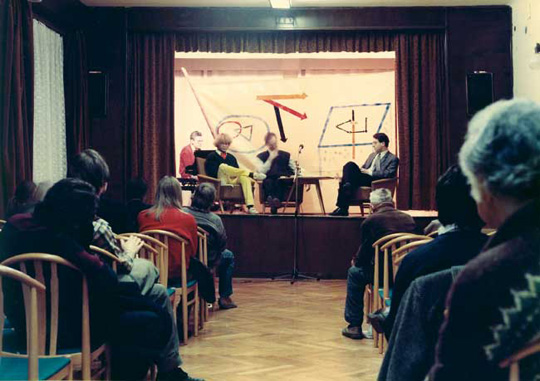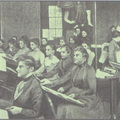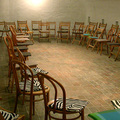
Fast Culture, Kossuth Club Budapest, 1986. Performative lecture of János Sugár, Ferenc Gerlóczy, Talán Sebeő, at the backgraound is Gábor Litván | © photo László Bókay, Balkon
Csaba Polony, Interview with János Sugár (Budapest, April 21, 1999)
/…/
An important activity that I did at that time was getting together with my “punk” philosopher and a writer friend and we put on a series of so-called “Fast Culture” events in which we would sit on a little stage of a sort of an evening university in three, and just start to talk freely as we would be alone.
The medium of speech really grabbed me then, and still does; we just speak without concious preparatitions, or thinking ahead (you can experience the opposite if you are live translated and you have to stop the continous flow of speech) — though it would come out in a dialogue with others. It’s like when you’re at a party and discussions spontaneously develop in the kitchen and all kinds of interesting things come out. And I wanted to be able to do the same thing as a public presentation. So we would have these events for several years and I would make some kind of backdrop to them, works that I made to fit the occasion. I documented these events on tape and with photos. It’s very possible that if we would listen to any of them now, nothing very relevant would come out; but at the time it was important and liberating. To be able to talk freely, and I don’t mean politically but internally, you have to say it, spit out everything that is inside of you. I’m sure you’re familiar with the kind of situation at meetings when people just can’t connect to the situation and since they have no other opportunity to open up and really bare their souls, and they just say things nothing to do with whatever the topic at hand is supposed to be. And the same thing happens with intellectuals. There are a lot of presentations, lectures in which maybe the most interesting thing is what is said in the last sentence, and what would really be interesting is what would follow that, to keep going beyond that. So with public presentations or dialogues it’s important to keep going further, to get things out. How far can we go with words? There’s no need to be afraid of it.
Another thing that I dealt with was the idea of pressure. When you are putting on a public presentation you have to say something, you can’t stop and start thinking to yourself for a few minutes, even a few seconds of silence is a long time in that kind of situation. So to set up a situation in which you simply must talk, I think that’s very exciting. And that was particularly true for that period. I think I instinctively came to feel the need for this and so I was able to carve my own path out of that depressing, boring, pointless, unmotivated atmosphere of that time.
We kept doing these “Fast Culture” events up until the late 80s. By that time there no longer was really a need for it, since after 1989 the system had changed, things opened up, it became possible to publicly talk much more freely, to openly set up new institutions, etc.
/…/
online képek:
1. Gyorskultura, program, 1984
http://exindex.hu/index.php?l=hu&page=3&id=489
1. Gyorskultura, Kossuth Klub, 1984
http://exindex.hu/index.php?l=hu&page=3&id=490
2. Gyorskultura, flyer, 1985
http://exindex.hu/index.php?l=hu&page=3&id=491
2. Gyorskultura, flyer, hátoldal, 1985
http://exindex.hu/index.php?l=hu&page=3&id=492
2. Gyorskultura, program, 1985
http://exindex.hu/index.php?l=hu&page=3&id=493
2. Gyorskultura, program, hátoldal, 1985
http://exindex.hu/index.php?l=hu&page=3&id=494
2. Gyorskultura, Kossuth Klub, 1985
http://exindex.hu/index.php?l=hu&page=3&id=495
3. Gyorskultura, flyer, 1986
http://exindex.hu/index.php?l=hu&page=3&id=496
3. Gyorskultura, flyer, hátoldal, 1986
http://exindex.hu/index.php?l=hu&page=3&id=497
3. Gyorskultura, Kossuth Klub, 1986
http://exindex.hu/index.php?l=hu&page=3&id=498
4. Gyorskultura, program, 1987
http://exindex.hu/index.php?l=hu&page=3&id=499
4. Gyorskultura, Kossuth Klub, 1987
http://exindex.hu/index.php?l=hu&page=3&id=500
5. Gyorskultura, program, 1988
http://exindex.hu/index.php?l=hu&page=3&id=501
http://artportal.hu/lexikon/muveszeti_iranyzatok/gyorskultura




